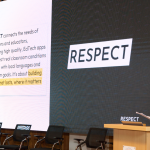April 27, 2021
EDUCATE webinar hears how countries coped with the Covid school shutdown

Countries around the world responded in different ways to remote learning during the pandemic but experienced many of the same challenges and a heroic effort by teachers, a webinar of global participants heard.
The event, hosted by EDUCATE Ventures and chaired by former UK Schools Minister Lord Jim Knight, brought together educators, policy makers, tech innovators and academics from several countries across four continents to discuss their experiences of the school shutdown and what lessons can be learned for the future.
Ulla Illison, Director General of the Estonian Education and Youth Board, said that digitalisation of the education system had been a government policy for the past 20 years and that both schools and students were well-prepared for the shutdown, with 95% of parents, teachers and students being connected.
As in many countries, including the UK, schools and students in Portugal were hindered by a lack of devices, Huge Fonseca, an EdTech innovator, told the webinar. He said teachers were “superheroes” and did what they could to connect with pupils, including distributing work on bicycles.
He said: “In Portugal there is a lack of devices and a lack of teacher training. The profession is among the oldest in Europe, and half of teachers are more than 50 years old. There is no government support to develop them, and if you leave teachers without learning new skills for 20 years or more then it is hard for them to adapt. We need more young people to go into teaching.”
In Uruguay, more coherence was needed between distribution of technology and teacher training. There was a “disconnect” between access to devices and the skills levels of teachers, which made them feel “alone and overwhelmed” Cecilia de la Paz, Founder and Director of educate.uy the bookpack, said.
Meanwhile, in Brazil, there was a roll-out of technology but little training for teachers. Ricardo Prado Schneider, Partner and Chief Scientific Officer of Square Learning Technologies said that technology had been “force fed” on teachers even though they were not sufficiently skilled to use it – and there was an expectation they should be “super heroes without the super powers”.
In Zambia, however, the pandemic offered an opportunity for project-based learning to address some of the problems faced by communities. An example of this was teaching physics through developing ways of creating an electricity supply – an approach that combined learning with the infrastructure needs of a developing country, Samson Sahmland-Bowling, Director of Open Energy Labs, told the webinar.
RECOMMENDED: https://global-edtech.com/category/edtech-market/
Some countries were now experiencing the knock-on effects of the pandemic. In Australia, for example, school leaders were considering reforms to end of phase assessment and the use of e-portfolios, according to Jane Hunter, Associate Professor of Teacher Education at the University of Technology, Sydney. She said the pandemic had shone a light on the heroic work of teachers and there was a “shift in perceptions about teachers, and the importance of face-to-face teaching as a valued part of civil society”.
Richard Culatta, CEO of ISTE in the United States, observed that global educational responses to the pandemic suggested schools and education networks that prioritised teacher training in technology use showed a more successful teaching and learning experience during the pandemic than where there was a focus on “cables and wires”. While this was important, it was often mistakenly expected to solve the challenges of remote learning, he said.
“Every time we have a massive disruption there is a boom in innovation afterwards. But the disruption does not cause the innovation but the conditions for smart people to make things happen. This can be one of the most transformational moments in education and we have a choice whether to take advantage of it. If we do not, we will go back to the way things were.”
Also on the panel were Gavin Dykes Programme Director, Education World Forum, James Dalziel, Head of School, NIST International School, Thailand and Udo Wichert, Senior Director Public Sector and Strategic Accounts, Filewave, Germany.
A recording of the webinar can be accessed here.









